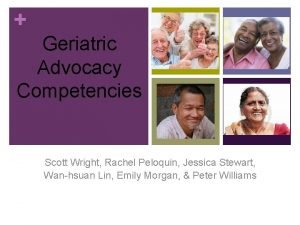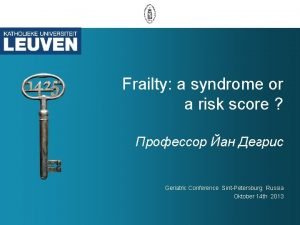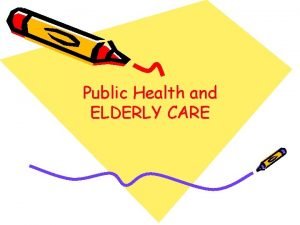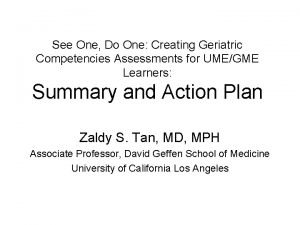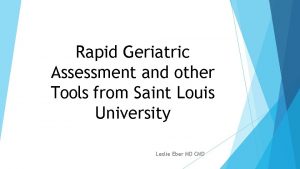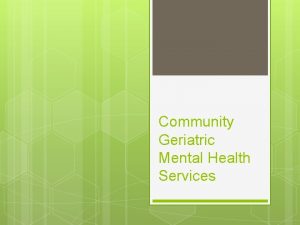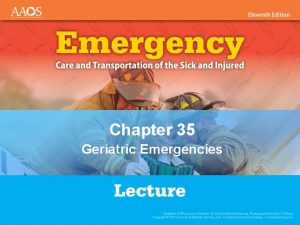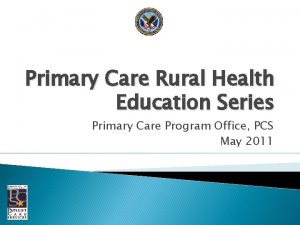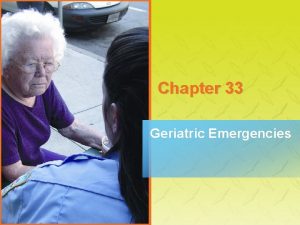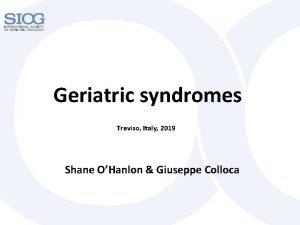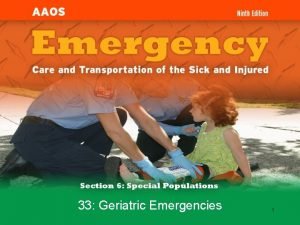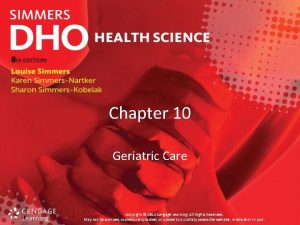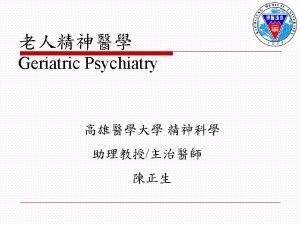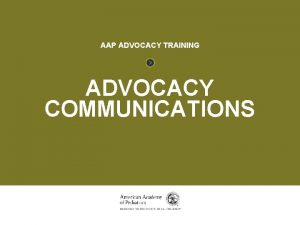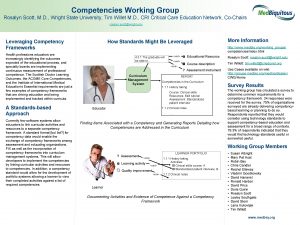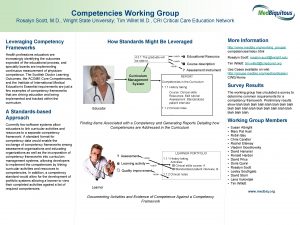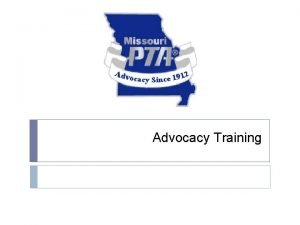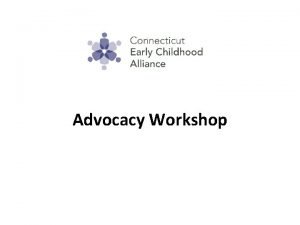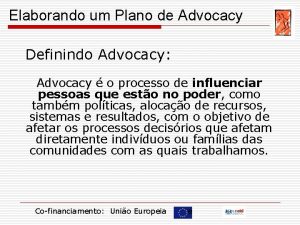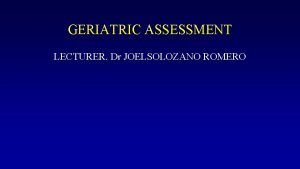Geriatric Advocacy Competencies Scott Wright Rachel Peloquin Jessica

















- Slides: 17

+ Geriatric Advocacy Competencies Scott Wright, Rachel Peloquin, Jessica Stewart, Wan-hsuan Lin, Emily Morgan, & Peter Williams

+ Elderly Client Empowerment n Emphasize n Discuss Autonomy, Meaning, and Ability the realities of Ageism n Empower client to overcome internalized Ageism

+ Client Advocacy (microlevel) n. Barriers to individual development: n Physical Ability: chronic pain, transport n Cognitive Ability: degenerative diseases, memory issues n Mental Health: highest rate of suicide & least likely to seek counseling n Spiritual Concerns: death anxiety & issues of meaning/purpose n Counselor n Competency: Geriatric issues As of 2009 only 2 graduate-level counseling programs in the USA are certified in gerocounseling in accordance with the Counsel for Accreditation of Counseling and Related Educational Programs (Foster, Kreider, & Waugh, 2009).

Counselor Competencies + n Part psychoeducational: n Navigate specialized resources n i. e. Adult Community Center Programs/Activities, Medicare & Medicaid, community transportation services n Part Collaborative: n Develop list of individualized barriers specific with client (brainstorm) n i. e. feelings of isolation, diagnosed with a medical condition, loss of license n Part n Creative: Create specialized plan and discuss how to implement n i. e. Client discloses that they feel like they have no one to talk to since their spouse passed away. Together, you discuss options: continue individual therapy, enroll in group therapy (bereavement -centered), attend community center.

+ Community Collaboration Failure to Thrive (FTT) in Elderly Clients n Causes n Malnutrition n Depression and dementing illnesses n Age-related changes n Inadequate support system n Attributes n Problems in social relatedness n Physical/cognitive dysfunction n Feelings of exclusion, shame, helplessness and worthlessness n Loneliness n Giving up

+ Community Collaboration n What will help? n Reminiscing n Create opportunities for elderly to share their stories and become socially involved n School mentoring program n Support groups at churches with others in their demographic n Day Care n To improve social interaction and increase activity n Work with organizations such as People Inc. and Aurora Adult Day Services to be sure that they are reaching the population and meeting these specific needs n Art therapy, exercise, nutritious meals

+ Community Collaboration n Validation Therapy n Acknowledging the person’s feelings as valid to restore dignity n Restore self-worth, reduce stress and justify living n Work with health care agencies and eldercare programs to educate them and train them to use validation therapy in their programs n Family system

Systems Advocacy Definition: n. Attempting to change systems such as policies , rules or laws of government, organization or agency to facilitate client’s development or meet their needs n. Working on how existing systems can be made more “older person friendly”

Example: Quality of Life Partnership n. Multi-agency signposting scheme - enable elderly to access preventive services n. Provide opportunities for frontline staff to learn from each other n. Older Person’s Accommodation Strategy - a theme on housing information and advice

+ Public Information n A public information counselor must advocate for the elderly on a macro-level • Educate the public about ageism • Be aware of stereotyping & microaggressions n The elderly experience societal oppression in Western Cultures • Undervalued (physically and cognitively) • Underemployed • Those with disabilities have an additional minority status • Sometimes difficult to get them to seek counseling n More likely to go to a religious figure rather than a professional therapist n May avoid the topic due to stigma that is more prevalent within their cohort

+ Public Info. – Adverse Drug Effects n Oliver et al. (2009) found an increasing amount of emergency room visits due to adverse drug reactions in the elderly (65 years+) n There is a need to increase the availability of information to the public about drug interactions and polypharmacy among the elderly n. A better way of educating the elderly themselves and those who may live with them is important n Awareness about what multiple doctors are prescribing at once is crucial, especially for those who are experiencing cognitive decline

+ Social and Political Advocacy

+ Types of Problems n. Abuse n. Financial n. Physical n. Sexual n. Research Funding n. Dementia n. Nutrition n. Innovative Care Models n. Seeking a better experience and lower costs

+ ALLIES n AARP (American Association of Retired Persons) n ELDERADVOCACYBLOG. COM n HEALTH INFORMATION COUNSELING AND ADVOCACY GROUP n AMERICAN HEALTH CARE ASSOCIATION n INNOVATIVECAREMODELS. COM n LONG TERM CARE OMBUDSMAN

+ Questions?

+ References n Baldridge, D. (2004). Double jeopardy: Advocating for Indian elders. Generations, 28, 75– 78. American Society on Aging. Retrieved from http: //generations. metapress. com/index/ 925742 r 572481706. pdf n Cohen, E. S. (1990). The elderly mystique: Impediment to advocacy and empowerment. Generations: Journal Of The American Society On Aging, 14(Suppl), 13 -16. n Foster, T. W. , Kreider, V. , & Waugh, J. (2009). Counseling students’ interest in gerocounseling: a survey study. Gerontology & geriatrics education, 30(3), 226 -42. doi: 10. 1080/02701960903133489 n Horton, C. (2009). Creating a stronger information, advice and advocacy system for older people. Retrieved from http: //www. jrf. org. uk/ system/files/information-systems-for-older-people-summary. pdf

+ References (cont. ) n Kimball, M. J. , & Williams-Burgess, C. (1995). Failure to thrive: the silent epidemic of the elderly. Archives of psychiatric nursing, 9(2), 99 -105. Retrieved from http: //www. ncbi. nlm. nih. gov/pubmed/7755414 n Kohler, I. , & Kendall, J. (2010). Bringing dementia out of the shadows for BME elders a report on the Ethnic Minority Dementia Advocacy Project ( EMDAP ). Dementia Advocacy Network at Advocacy Plus, 14(1), 12 -16. n Olivier, P. , Bertrand, L. , Tubery, M. , Lauque, D. , Montastruc, J. -L. , & Lapeyre-Mestre, M. (2009). Hospitalizations because of adverse drug reactions in elderly patients admitted through the emergency department: a prospective survey. Drugs & aging, 26(6), 475 -82. doi: 10. 2165/00002512 -200926060 -00004
 Charles peloquin trainer
Charles peloquin trainer Sample jira workflows
Sample jira workflows Geriatric syndrome
Geriatric syndrome Objectives of geriatric nursing
Objectives of geriatric nursing Geriatric competency assessment
Geriatric competency assessment Sarc f
Sarc f Geriatric giants
Geriatric giants Community geriatric psychiatry
Community geriatric psychiatry Geriatric giants
Geriatric giants Gems diamond geriatric assessment
Gems diamond geriatric assessment Va geriatric scholars program
Va geriatric scholars program Gems diamond geriatric
Gems diamond geriatric What is geriatric syndromes
What is geriatric syndromes Geriatric case presentation
Geriatric case presentation 4 geriatric giants
4 geriatric giants Gems geriatric diamond
Gems geriatric diamond Chapter 10:1 myths on aging
Chapter 10:1 myths on aging Geriatric psychiatry definition
Geriatric psychiatry definition
